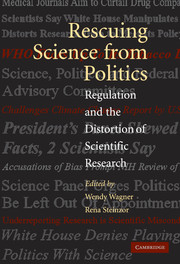PART III - A PUBLIC INFRASTRUCTURE FOR SCIENCE
Published online by Cambridge University Press: 04 August 2010
Summary
In this final part, we consider the appropriate role for government in ensuring both the validity and support of science used for regulation. The principles stress that peer review and support of research should be balanced and prioritized, giving greatest attention to scientific research that promises the greatest public benefit and is in the greatest need of government oversight.
Peer Review
The first, important area of government oversight of regulatory science – peer review – requires the assembly of balanced panels and careful attention to preventing unwarranted intrusions into research through politicized review. The applicable principles state:
In appropriate circumstances, peer review is an important step in the process of scientific discovery, but peer review should never be used to censor scientific research.
Legitimate scientific peer review does not encompass processes that enable outside stakeholders to pressure scientists to change their views in light of an anticipated policy outcome.
Peer review should be done by a balanced group of peer reviewers who have no present or past conflicts of interest likely to affect their review and who specialize in the area. Peer reviewers should disclose the limits of their expertise in assessing the research.
Entities that select peer reviewers should disclose any financial conflicts of interest and affiliations or perspectives that may influence their choice of reviewers. The selection of reviewers must never be politicized.
Despite widespread consensus among scientists, these basic commitments have been violated in a number of ways over the last decade.
- Type
- Chapter
- Information
- Rescuing Science from PoliticsRegulation and the Distortion of Scientific Research, pp. 215 - 218Publisher: Cambridge University PressPrint publication year: 2006



